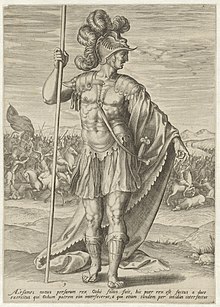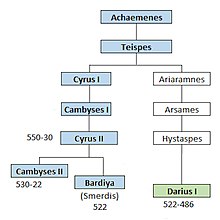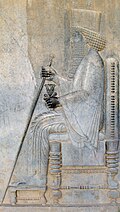| Arsames | |
|---|---|
 Anonymous anachronistic engraving depicting King Arsames. Created in Antwerp, dated 1547-1585 Anonymous anachronistic engraving depicting King Arsames. Created in Antwerp, dated 1547-1585 | |
| Died | After 522 BC |
| Issue | |
| Old Persian | Aršāma |
| Modern Persian | Arshām |
| Dynasty | Achaemenid |
| Father | Ariaramnes |

Arsames (Old Persian: 𐎠𐎼𐏁𐎠𐎶 Aršāma, modern Persian:،آرسام، آرشام Arshām, Greek: Ἀρσάμης) was the son of Ariaramnes and the grandfather of Darius I. He was traditionally claimed to have briefly been king of Persia during the Achaemenid dynasty, and to have given up the throne and declared loyalty to his relative Cyrus II of Persia before retiring to his family estate in the Persian heartland of Parsa, living there peacefully for the rest of his life, perhaps nominally exercising the duties of a "lesser king" under the authority of the "Great King". However, the claim that he or his son were ever kings is rejected by historians such as Pierre Briant. In an inscription allegedly found in Hamadan he is called "king of Persia", but the document is widely argued to be a fake, either modern or ancient. Another attestation of his reign is the Behistun Inscription, where his grandson Darius I lists him among his ancestors, although he does not explicitly mention him as being one of the anonymous eight kings whom he claims preceded him.
Arsames was the father of Hystaspes (satrap of Parthia), Pharnaces (satrap of Phrygia) and Megabates (a general). Arsames lived to see his grandson, Darius I, become the Great King of the Persian Empire, though he died during his reign. Arsames and his son Hystaspes are noted as being alive in 522 BC, indicating that he had survived well into old age.
His name (Aršāma) translates to "having a hero's strength". The feminine version of the name is Aršāmā (modern Persian:ارشاما , Greek: Arsamē), and was the name of the daughter of Darius I, likely named in reference to him.
References
Citations
- Akbarzadeh & Yahyanezhad 2006, p. 56.
- Kent 2005, p. 393.
- Kent 2005, p. 392.
- ^ Briant 1996, p. 121.
- The inscription is known among Old Persian scholars by the code AsH.
- ^ Shahbazi.
Works cited
- Akbarzadeh, D.; Yahyanezhad, A. (2006). The Behistun Inscriptions (Old Persian Texts) (in Persian). Khaneye-Farhikhtagan-e Honarhaye Sonati. ISBN 964-8499-05-5.
- Briant, Pierre (1996). Histoire de l'Empire perse, de Cyrus à Alexandre (in French). Fayard. ISBN 2-213-59667-0.
- Kent, Ronald Grubb (2005). Old Persian: Grammar, Text, Glossary (in Persian). Translated by Oryan, S. Pizhūhishkadah-i Zabān va Gūyish bā hamkārī-i Idārah-i Kull-i Umūr-i Farhangī. ISBN 964-421-045-X.
- Shahbazi, A. Sh. "ARŠĀMA". Encyclopaedia Iranica. Retrieved April 9, 2020.
External links
| Arsames Achaemenid dynasty | ||
| Preceded byAriamenes | King of Persia (disputed) | Succeeded byCyrus II |
| Median and Achaemenid kings | |
|---|---|
| Family tree | |
| Median (728–550 BC) | |
| Achaemenid (550–330 BC) |
|
| Italics indicate kings not directly attested and so possibly legendary. | |
| Rulers in the Achaemenid Empire | ||
|---|---|---|
| Family tree - Achaemenid Kingdom | ||
| Kings of Kings of the Achaemenid Empire |  | |
| Satraps of Lydia | ||
| Satraps of Hellespontine Phrygia | ||
| Satraps of Cappadocia | ||
| Greek Governors of Asia Minor cities | ||
| Dynasts of Lycia | ||
| Dynasts of Caria | ||
| Kings of Macedonia | ||
| Kings of Tyre | ||
| Kings of Sidon |
| |
| Satraps of Armenia | ||
| Satraps of Egypt | ||
| Satraps of Bactria | ||
| Satraps of Media | ||
| Satraps of Cilicia | ||
| Other known satraps | ||
| In most territories, Achaemenid rulers were succeeded by Hellenistic satraps and Hellenistic rulers from around 330 BC | ||
This biography of an Iranian ruler or member of a royal family is a stub. You can help Misplaced Pages by expanding it. |